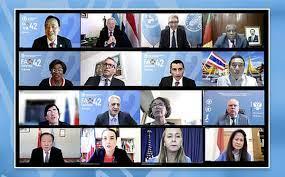
Endorsed at the last day of the 42nd Session of FAO Conference, the supreme decision-making body that brings together all FAO Members - 194 countries plus the European Union, the Strategic Framework 2022-2031 seeks to support the 2030 Agenda for Sustainable Development through the transformation to more efficient, inclusive, resilient and sustainable agri-food systems for better production, better nutrition, a better environment, and a better life, leaving no one behind.
The Strategic Framework focuses on the Sustainable Development Goals (SDGs) number 1 (no poverty), 2 (zero hunger) and 10 (reduced inequalities) as well as supporting the achievement of the broader SDG agenda.
To implement the Framework, FAO will apply four cross-cutting "accelerators" to all its programme interventions to maximize efforts and facilitate the management of trade-offs, according to national priorities. These accelerators are technology, innovation, data, and complements (governance, human capital, and institutions).
Twenty Programme Priority Areas were identified that are inter-disciplinary, issue-based technical themes, where FAO has a comparative advantage, track record and ability to act.
In his closing remarks to the Conference, FAO Director-General, QU Dongyu, thanked Members for their valuable participation and strong support for the Strategic Framework.
"Your support for our vision and our efforts of translating the concept into action is highly appreciated," QU told the Conference. "It is a big task that we humbly accept."The Conference also approved the Programme of Work and Budget 2022-23 and the Medium-Term Plan 2022-25.
These three documents will guide FAO's work at a critical time as the world faces the impacts of the COVID-19 pandemic, which could push up to 132 million more people into chronic hunger by the end of 2021.
Those strategic documents also reinforce and complement the organizational structure and management changes already put in place to make FAO a more modular, flexible and agile organization.
In its final report, the Conference stressed the importance of promoting innovation, digital technologies, and data to transform agri-food systems. Members also expressed their support for FAO's main initiatives, such as the Hand-in-Hand Initiative and the COVID-19 Response and Recovery Programme.
The Director-General highlighted the value of collaboration and support from Members. "We will continue our constructive dialogue, formally and informally, in mutual respect and trust," he stressed.
Hans Hoogeveen elected new Independent Chairperson of the Council
Chaired by Michał Kurtyka, Poland's Minister of Climate and Environment, the Conference also elected Ambassador Hans Hoogeveen, the Permanent Representative of the Kingdom of the Netherlands to the UN Organizations in Rome, as the new Independent Chairperson of the Council (ICC) for the next two years (2021-2023).
In another first in the Organization's history, FAO Members were able to vote physically at Headquarters in Rome and in New York to elect the new Independent Chairperson of FAO Council following a voting modality they had chosen amongst options suggested by the Secretariat. The election was a model of a democratic UN governance process.
The Director-General congratulated Hoogeveen on his election and said he looked forward to "a constructive and efficient collaboration."
Hoogeveen has worked with FAO in various roles for more than 25 years. He has served as chair of the FAO Programme Committee, Chair of informal consultations on the 10 Elements of Agroecology, Chair of the Committee on Food Security (CFS) working group on food systems and nutrition, and as vice-chair of the FAO Regional Conference for Europe.
The outgoing Independent Chairperson of the Council, Khalid Mehboob from Pakistan, said that it had been an honour and privilege to serve in that position for the last four years.
Mehboob has been involved in the work of FAO since 1969. For 40 years (1969 to 2009), he worked for FAO, starting as a junior professional and reaching the level of Assistant Director-General. From 2010 to 2017, Mehboob served as Alternate Permanent Representative of Pakistan to FAO.
Progress welcomed as FAO targets climate change
The Conference also welcomed progress made under the previous Programme of Work 2018-19, noting that FAO had achieved 95 percent of its targets in that period. It also commended FAO for mobilizing significant funds for climate action during the last biennium and welcomed the decision to anchor the Programme Priority Areas (PPAs) of the new Startegic Framework in the 2030 Agenda.
On the opening day of the Conference, Italian President, Sergio Mattarella, and Pope Francis pledged their support for FAO's efforts to build a better world anchored in sustainable agri-food food systems that can provide healthy and affordable diets for all and resist future crises.
The technology entrepreneur and philantropist, Bill Gates, delivered the McDougall Memorial Lecture, which honours the legacy of Frank Lidgett McDougall, an Australian agricultural expert who was instrumental in creating FAO.
In his lecture, Gates stressed that investment in science and technology was essential for advancing climate-resistent agriculture and assisting small-holder farmers. His presentation was followed by a high-level round table discussion with the participation of agriculture ministers from all regions.
The FAO Conference takes place every two years. It determines the strategies and policies of the Organization, approves the budget, and makes recommendations to Members on food and agriculture issues.
The 42nd session of the Conference was the first one held virtually in history. It saw record-breaking participation from around the world - over 1,300 people, including 119 Ministers - on its opening day.










Add new comment